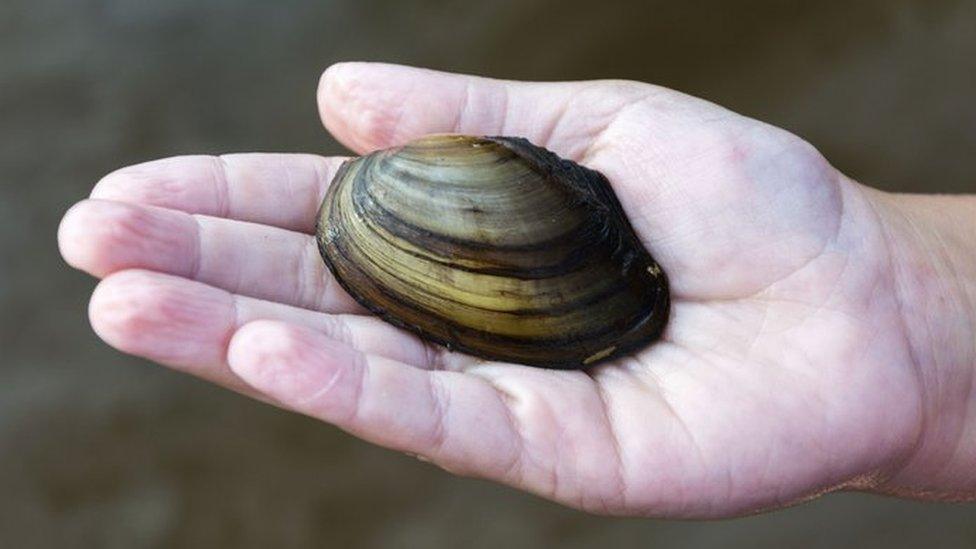Mussel numbers in River Thames drop by 95% since 1964
- Published
- comments

Scientists are worried about what this means for the river's ecosystem
There are now nearly 95% fewer mussels in the River Thames than there were in 1964, according to a new survey.
Scientists looked at an area of the Thames near Reading, England and found a much smaller number of mussels than when they last counted.
Some species of mussel have vanished completely.
The research team are worried about what this means for the river's ecosystem, because mussels filter water, eat algae and provide food for other river creatures.
Where is the River Thames?
The Thames is a huge river that runs through London.
It's over 340 kilometres long!
Although you might think of the sea when you picture mussels - there's plenty of them in rivers in the UK
What does this mean?
Scientists think there could be a few different reasons behind the falling numbers.
The first is that there is less raw sewage being pumped into the River Thames than in 1964.
Raw sewage is water that has not been treated yet - it's what comes out of your toilet and into the sewers!
With less sewage water there will be less algae in the river, which is what the mussels feed on.
This means mussels are growing at a much smaller rate, because they aren't feeding as much.
Algae are plants that live in water - they don't have stems, roots or leaves like normal plants but contain chlorophyll, which makes them green
The river's food chain
Mussels are cleaning machines - they filter up to 40 litres of water a day. They also consume lots of nutrients from the riverbed.
When mussels are eventually eaten, these nutrients are passed on to whatever creature eats the mussels.
This is all a part of the food chain - how plants and animals exist together.
Picture an ecosystem like a machine, all full of different parts that make it work together. If you took just one small part away, it could completely change how the ecosystem works.
If the river has less mussels, it's likely to cause issues for the rest of the creatures in the water. There will be less filtered water and fewer nutrients for larger creatures to eat.
From tiny plants all the way up to big birds, the river's environment relies on the creatures around it
What else did the survey show?
There is an increased number of different types of mussels - like the zebra mussel.
However, these numbers do not make up for the huge reduction since the 1960s.
Some of the new mussels were not native to the area, and scientists think they came to the Thames by being attached to boats travelling from, or returning from, overseas.
Can you see the stripy pattern that gives the zebra mussel its name?
What can be done?
Although the survey shows a concerning picture of the number of mussels, it's still not fully clear why the mussel population has reduced by so much.
The last survey was done since in 1964 - so a lack of surveys in between makes it very difficult for the scientists to identify trends in the falling numbers.
This is usually how scientists can work out factors behind changing numbers in creature populations.
The researchers have said doing more surveys - as well as looking at the numbers more closely in the future - will help work out how to look after mussels and the general health of the river.
- Published28 November 2022
- Published10 June
- Published30 November 2022
